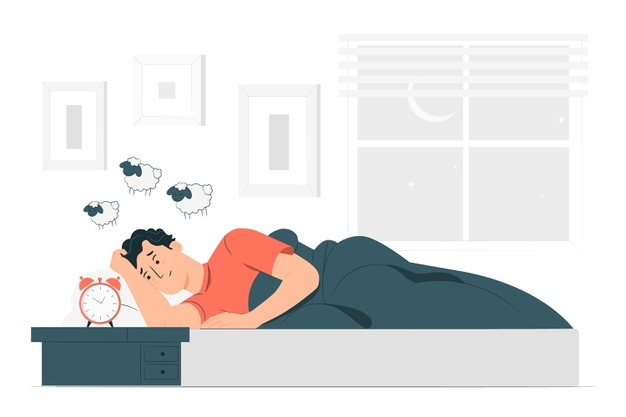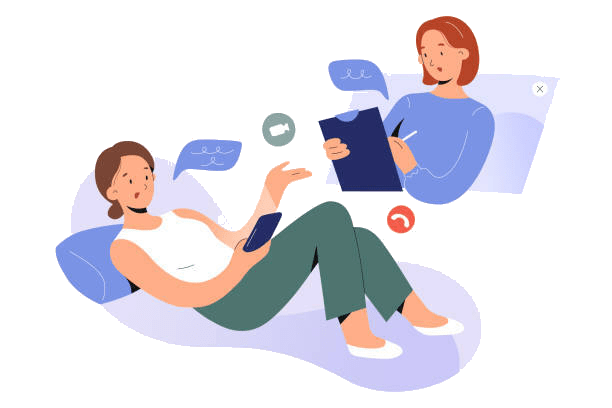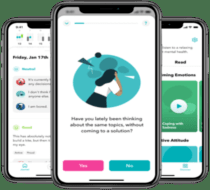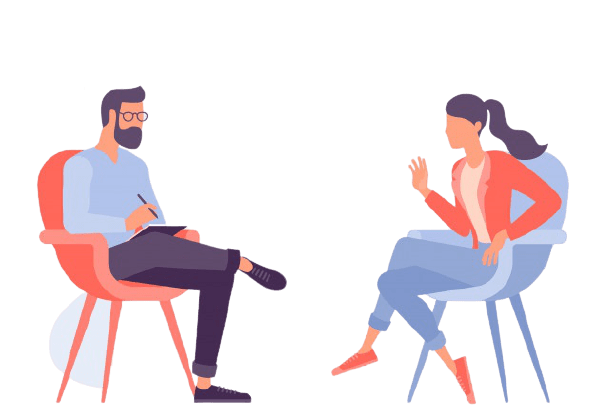Online Insomnia Counselling | Best therapist for sleep disorder
- Affordable and confidential insomnia counselling sessions
- Video calls or chat sessions with Counsellors/ Psychologists specialized in insomnia issues
- Improve your mental wellbeing whenever and wherever you want
Begin Therapy
Consult online with best Therapist
"*" indicates required fields
A ‘Better’ Model for Insomnia Counselling
Mantracare is with you in the journey to heal your insomnia. We will help you right from knowing the root causes of your insomnia to learning the healthy coping mechanisms. Our therapies are 100% online and are conducted via video call or messaging. So, feel free to take sessions wherever, whenever you need it
Specialized Therapists
As per your story and case, we assign the best counsellors experienced in insomnia issues. They work with you proactively to understand and address the root cause of your insomnia, and hopelessness and persistent sadness occuring because of it.
Affordable & Effective
We believe that therapies should be driven more by “Need” than “ability to pay”. Our online sessions are 90% less expensive than face-to-face therapy. Online counseling starts at just $10.
Insomnia Self Care
We provide you continuous insomnia help with self-care tools, mental healing videos, chat groups, meditations, breathing exercises and more. Our therapists are available 24/7 via messages to provide care, whenever and wherever you need it.

Best Insomnia Counseling, Now in Your Pocket
Our therapists or counselors are available in all parts of the world, accessible via an easy-to-use mobile application. Our matching experts takes your preferences in consideration and connect you with therapists specialized in insomnia issues. Movever, there are hundreds of free self help tools on our app, available 24×7.

How it works
After filling out our questionnaire, you will be matched with a sleep disorder counselor based on your needs and preferences. You and your counselor will get your own secure and private “therapy room” where you can message your counselor at any time wherever you are. You can also schedule a session so speak live with your counselor over video or phone.
You can write or talk about insomnia, the things going on in your life, ask questions, and discuss the challenges you’re facing and your counselor will provide feedback, insights, and guidance. Together you’ll work towards making a positive change in your life, accomplishing your goals, and overcoming your insomnia.

Signup for insomnia counselling
Just fill up a 5-minute online form to tell us about your insomnia symptoms and treatment expectations.

Meet your Therapist
Based on your preferences and neet, we will connect you with Depression counselors that are available 24/7 to you via call or chat.

Connect to our app
Heal yourself with video or chat counselling sessions available in the app. Access helpful self-care tools on our app to help you heal your depression, and take control of your life
Meet The Best Insomnia Therapists
MantraCare psychologists help you counter insomnia through a combination of positive conversations, exercises, and meditations. Our insomnia therapy services are better than traditional face-to-face counseling in multiple ways:
- Over 5,000 counselors & therapists with expertise in insomnia and other areas
- All counselors are licensed, trained, accredited and highly experienced
- Match with an available counselor who is the best fit for your insomnia needs
- Unlimited private one on one communication with your therapist
- Gain access to constructive, educational group webinars on insomnia

A Guide on Insomnia /Sleep Disorder
Understanding Insomnia
Insomnia is basically a sleeping disorder wherein you struggle with falling asleep. And even if you sleep, the disorder will not allow you to sleep for long hours. In shorter words, insomnia is both trouble in falling asleep or having uninterrupted sleep.
The condition might be acute or chronic. That is, insomnia might be short term or it can last for a longer time respectively.
Types of Insomnia
Mainly there are two types of insomnia namely primary and secondary.
Primary Insomnia: Insomnia is called primary when no other health issues are discovered in the patient’s body related to the sleeping disorder.
Secondary Insomnia: And it is considered secondary when the sleeping issues other disorders are occurring due to health issues such as depression cancer arthritis asthma or heartburn.
Other types of insomnia:
Apart from primary and secondary, insomnia is also of some other types. They are:
- Sleep Maintenance Insomnia: This can be classified as too early to get up and too late to get back to sleep. When you face trouble staying asleep through the night and then waking up too early in the mornings.
- Sleep Onset Insomnia: This is simply facing trouble are struggling to sleep
- Mixed insomnia: You can call it a blend of sleep-onset insomnia and sleep maintenance. So what happens here is that you face trouble in both falling asleep and maintaining sleep all through the night.
- Paradoxical insomnia: This is a condition of confusion and dilemma in relation to your sleeping hours. A person suffering from paradoxical insomnia usually underestimates. the time they are asleep. They feel like they have been sleeping a lot more than they really do.
Causes of Insomnia
Causes of insomnia can be categorized under primary causes and secondary causes let’s discuss them one by one
Primary Causes of Insomnia
- Stress: You just cannot deny the power of stress. Stress-related to your personal and professional life is a very important role in your sleep, both in terms of quantity and quality. Some stressful life events such as death, illness of loved ones, joblessness, or relationship issues may lead to sleep insomnia. Depression and anxiety are some of the mental health issues that can cause insomnia
- Uncomfortable sleeping surroundings: If you come across noise light or a favorable temperature it is obvious that your sleep will be interrupted.
- Genes: Some families have the tendency of insomnia.
- Irregular sleeping habits: Poor sleeping habits and constant change in your sleep schedule can cause insomnia as well. Being on screens before bedtime, or taking naps during the day will disrupt your sleeping habits.
Secondary Causes of Insomnia
- Medications: there are some prescriptions given by doctors that cause hindrance in your sleep and also cause insomnia. These are basically the oct (over-the-counter) medicines. and they might include medication being taken for high blood pressure, asthma, depression, allergies, weight loss, or cold.
- Medical conditions: there are some conditions linked with insomnia including cancer, diabetes, heart disease, Alzheimer’s disease, overactive thyroid (hyperthyroidism), and Gastroesophageal Reflux Disease (GERD).
- Caffeine nicotine and alcohol: stimulants such as coffee tea cola and other caffeinated drinks hurdles your sleep. Having them in the afternoons or late in the evening can restrict you from sleeping at night. Nicotine in tobacco products is also a stimulant that disturbs slips. Alcohol does make you fall asleep but it prohibits deeper stages of it and usually makes you awake in the middle of the night.
- Sleep-related disorder: Some sleeping difficulties such as sleep apnea or restless legs syndrome affects your sleep. The latter is the condition wherein you might feel an unpleasant sensation in your legs restricting you to move your legs in the desired manner, hence preventing you from falling asleep.
Symptoms of Insomnia
The symptoms of insomnia are as follows:
- Dizziness and sleepiness during the day
- Restlessness and fatigue
- Difficulty falling asleep at night
- Facing interrupted sleep
- Waking up too early in the morning
- Irritability
- Depression and anxiety
- Increased chances of errors and accidents
- Grumpiness
- State of confusion
- Problems with memory and concentration
- Constant worries about sleep.
Risk Factors of Insomnia
At some point or the other in life, every one of you must have gone through some occasional problems related to sleep. But you are seen at increased risks of insomnia due to the following reasons.
- Gender: Yes, if you are a woman you are at a higher risk of insomnia as compared to men. Reasons are the hormonal shifts during the menstrual cycle and menopause. Night sweats and hot flashes are very common during menopause and this disrupts your sleep.
- Age: When you cross 60 changes in sleep patterns and health and fast-moving internal clocks cause insomnia
- Mental or physical health condition: Many mental or physical issues related to health affect sleep.
- Irregular schedule: A lot of traveling changing shifts at the workplace affects your sleep-wake cycle.
Risk Factors of Insomnia
At some point or the other in life, every one of you must have gone through some occasional problems related to sleep. But you are seen at increased risks of insomnia due to the following reasons.
- Gender: Yes, if you are a woman you are at a higher risk of insomnia as compared to men. Reasons are the hormonal shifts during the menstrual cycle and menopause. Night sweats and hot flashes are very common during menopause and this disrupts your sleep.
- Age: When you cross 60 changes in sleep patterns and health and fast-moving internal clocks cause insomnia
- Mental or physical health condition: Many mental or physical issues related to health affect sleep.
- Irregular schedule: A lot of traveling changing shifts at the workplace affects your sleep-wake cycle.
Complications of Insomnia
Sleep is as important as food and water in your life. Whatever be the reason for your sleeplessness or sleep loss, insomnia is going to affect you both mentally and physically. People with insomnia suffer a lower quality of life as compared with people who have well-structured sleeping habits.
So the complications of insomnia can be:
- Lack of performance in the job or at school
- Not able to pay much attention when required for example while driving
- Depression anxiety disorders or substance abuse and other mental health disorders
- Higher risks and intensity of long-term diseases such as hypertension and cardiovascular diseases.
Sleep disorder Tests
If you want to know whether he was suffering from insomnia or not the only way is to visit the doctor. Initially, you can refer to the sometimes re-care doctor I tell you to visit some sleep specialist for further evaluation if need be.
There is no single test that can diagnose insomnia. However multiple questions and examinations can help your sleep specialist learn about what’s troubling you and keeping you awake.
How will a doctor examine Sleep issues?
Before the next appointment, your doctor might ask you to maintain a sleep diary that can help him know how well or not you are sleeping or what things you do to make sleeping harder.As per the readings of the above record and the doctor’s suspects, your doctor might ask you to have some tests such as:
Sleep Study/ Polysomnogram test
Also called the polysomnogram test, sleep study helps you to measure the ease you fall asleep with and how long you stay asleep. The test is also useful to learn whether someone has a sleep disorder such as restless legs syndrome, sleep apnea, or narcolepsy.
While the test is being performed you need to wear some sensors on your face, chest, arms, legs, and fingers and the doctors ask you to sleep up while the sensors will monitor you. The senses monitor you:
- Heart rate
- breathing levels
- oxygen levels
- brain waves
- muscle movements
Actigraphy
To measure how well you sleep this is another type of sleep test you do at home. What you do is a sensor on your back and ankle for a few weeks that helps you monitor when you sleep and when you wake up.
Blood Tests
To find out how to clear out the suspect the doctors will perform a blood test for thyroid disease, low vision levels, and other medical conditions causing sleep problems.
Treatment of Insomnia
When it comes to the treatment of insomnia it can be done by nonmedical therapy and medications as well. Some nonmedical therapy can include developing better sleep and a psychotherapy
Sleep Medications
Some sleep-inducing drugs are:
- Benzodiazepine sedatives such as triazolam (Halcion), estazolam, lorazepam (Ativan), temazepam (Restoril), flurazepam, and quazepam (Doral).
- Non-benzodiazepine sedatives such as zolpidem (Ambien, Intermezzo), eszopiclone (Lunesta), and zaleplon (Sonata) are drugs that can help induce sleep.
The bad part about these medications is that if used extensively, they become addictions.
Plus, if you take these medications with any drugs that depress the central nervous system such as alcohol, they can be dangerous for you. But the side effects with non-benzodiazepine.
Some other medicines treating insomnia are:
- Belsomra
- Doxepin
- Antidepressant
- Ramelteon
Relaxation Therapy
- Many people suffering from sleeping difficulties just need a sufficient amount of relaxation. If stress is the cause of your sleeplessness, you must have a treatment for yourself.
- Some breathing exercises help you in relaxation:
- Complete exhaling from your mouth
- Inhale fully through your nose
- Hold your breath and count till seven
- Exhale from your mouth at eighth count
- Repeat the cycles three times.
Exercise
Exercise helps in what not. It helps in sleeping troubles as well. Some moderate or low-intensity exercises can help you sleep better and provide you with more energy when you are awake. Make a routine of doing exercise at least 3 to 4 times a week for 20- to 30 minutes. You should consult with your doctor for the type of exercise you need to do.
10,000+ Happy & Healed insomnia patients

“I forgot how to sleep. My body was deprived of falling asleep and then waking up fresh and fine. Ofcourse, there was something “not right” with me. I met several doctors. But no one could provide me the assistance and guidance that Mantra Care experts have provided me with. My sleeps are back on track now. Thank you Mantra Care.”
Kevin, 1 year on MantraCare
500+ Insomnia /Sleep issues Counselors








Our therapists take care of your ‘unique’ needs
Not all mental health problems are the same. Different types of problems require different treatments. At MantraCare, 5000+ therapist’s cover a range of specialities to meet your needs:
Frequently Ask Questions
Insomnia is a common and serious medical illness that negatively affects your health. In shorter words, insomnia is both trouble in falling asleep or having uninterrupted sleep.
Some of the common symptoms of insomnia are:
- Dizziness and sleepiness during the day
- Restlessness and fatigue
- Difficulty falling asleep at night
- Facing interrupted sleep
- Waking up too early in the morning
- Irritability
- Depression and anxiety
- Increased chances of errors and accidents
- Grumpiness
- State of confusion
- Problems with memory and concentration
- Constant worries about sleep.
One of the most serious complications of major insomnia is that you won’t feel active throughout the day because of which you won’t be able to perform well in your day-to-day activities, be it your workplace or home. Some other complications are:
- Depression
- anxiety disorders
- long-term diseases such as hypertension and cardiovascular diseases.
Insomnia can be of following types:
- Sleep Maintenance Insomnia
- Sleep Onset Insomnia
- Mixed insomnia
- Paradoxical insomnia
When insomnia becomes a major concern, it starts causing troubles in your day-to-day life. You will not be able to concentrate even after trying so hard. You will unnecessarily start feeling tired.
You must know that it’s not necessary that sleep problems only occur with older people and not with children and teenagers. It does occur and can be the cause of concern for children also.
It has been found that insomnia becomes more prominent and common with age. As you age you experience alterations in sleeping patterns, changes in activity, health changes and you are more dependent on medications. All this accelerates insomnia and its symptoms.
Online insomnia therapy has been proven to have the same effectiveness as in-person therapy. There are multiple reasons why online counselling proves to be better:
No need to travel to a psychologist, sit on the same couch, and talk with the same therapist. Online insomnia therapy doesn’t require that you leave the comforts of your home or office. Talk to your therapist in your pajamas, sitting on your bed!
Most of us live hectic, unbalanced lives wherein scheduling a traditional therapy session becomes prohibitive. Online insomnia therapy allows you to set the time, location, and initial direction of the therapeutic relationship. It’s freedom that puts you, the client seeking mental health solutions, first.
We offer a vast array of free self-help tools such as stress & anxiety control exercises, relaxation techniques, mindfulness exercises, and helpful blogs. We also offer mental healing videos, chat groups, breathing meditations, and more, available 24/7 at no charge. However, there is a nominal price for insomnia counseling. That said, we provide one of the most affordable ways to tackle insomnia .
The cost of insomnia counseling through MindMantra ranges from $15 to $40 per week. Unlike traditional in-office therapy which can cost over $150 for a single session, your MindMantra membership includes unlimited text, video, as well as audio messaging.

